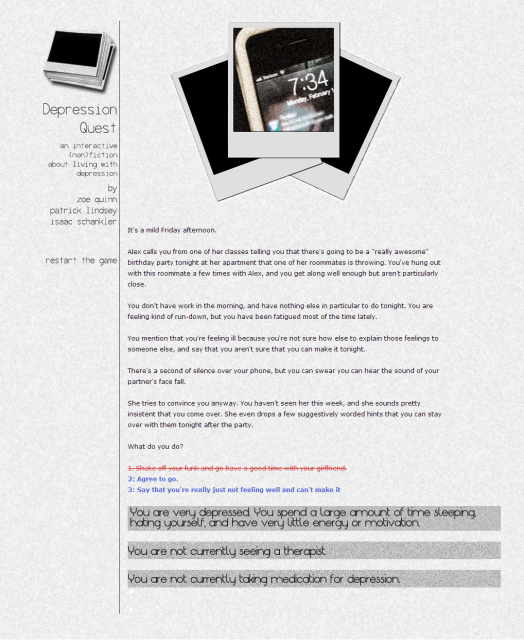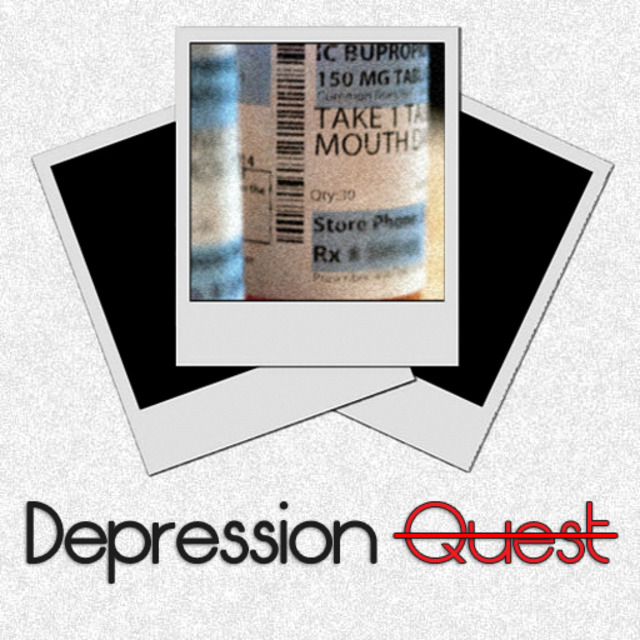
Despite recent advances in our culture to discuss and normalize it, mental disorders remain stigmatized and marginalized in large parts of society. Those struggling with mental health issues often find it difficult to come forward and admit that they need help, or even acknowledging to themselves that something is amiss. Given recent events in the news as well as some personal developments, I’ve taken an interest in learning more about mental health, the effects of mental disorders, and what can be done to improve our collective understanding and response to these issues. As part of my learning I finally fired up a game that’s been sitting in my Steam library for what feels like years; the much debated Twine darling, Depression Quest.
The game, developed by a three person team consisting of Zoë Quinn, Patrick Lindsey, and Isaac Schankler, is a work of interactive fiction that places the player in the role of someone who is suffering from depression. Depression Quest uses a minimalist, web browser-like interface that is almost entirely text based. There are no animations nor environments to explore. The only things accompanying the prose are some music to set the tone and nonspecific pictures. The game establishes an earnest mood with the opening screen stating the developers’ intent:
The goal of this game is twofold: firstly, we want to illustrate as clearly as possible what depression is like, so that it may be better understood by people without depression. Hopefully this can be something to spread awareness and fight against the social stigma and misunderstandings that depression sufferers face. Secondly, our hope is that in presenting as real a simulation of depression as possible, other sufferers will come to know that they aren't alone, and hopefully derive some measure of comfort from that.
It’s certainly a noble goal, and one that admittedly got me liking the game from the start. The game also makes it clear that since everyone’s experience with life and depression are different, it only attempts to provide a sample representation of the disorder. That being said, I enjoyed how broadly the game was written. The game makes a few assumptions of the player character, namely that they aren’t a straight female, likely middle class, in their 20s, and lives in a first world country. But aside from that, details are left sparse to ensure relatability. The prose itself is incredibly well-written, focusing mainly on the character’s mind-state. Further to that, the character’s interactions with their closest friends and family provided just enough to endear them to me without them feeling overly detailed. The combination of these elements allowed to reflect on my own connections with others. For instance, the interactions with the player’s brother, Malcolm, had me thinking the relationship I have with my own sibling, and while my circumstances don’t exactly match up with the game, the relationship felt authentic to my experiences. I was especially taken aback by a powerful scene later on in the story that simply ended with Malcolm saying "Hey, just so you know... I'm really proud of you." I’ll not spoil the context, but suffice it to say that it brought about some powerful emotions in me.

The actual gameplay is a fairly small but significant part of the experience. The player is given choices throughout the story, such as whether to go out to a party or stay in or to open up to friends about their condition, that alter the game’s events. However, like most decision based games, the overarching narrative changes little over multiple playthroughs. This does not feel like a limitation but rather an accurate representation of real life. More often than not, the choices we make only affect us and possibly those closest to us, but the greater world marches on. To reflect this, the decisions made have a significant effect on what options the player is left with later on, even if major events don't change all that much. Depression Quest uses a brilliant mechanic of crossing out possible options based on the character’s mental state. You can still see these crossed out options, but cannot pick them. For instance, refusing to seek help early on pushes the character further into their depression which in turn limits options to save certain relationships or get help at later points. I absolutely adored this mechanic, as it accurately captured that feeling of wanting to say or do something but can’t, be it due to fear, apathy, or any number of other motivations. This was the aspect of the game I found most interesting and I hope more dialog driven games incorporate the mechanic.
I admittedly can’t fully discuss Depression Quest without acknowledging the elephant in the room; is it even a game? The controversy surrounding the game and it’s creators is well documented and I need not recount them here, but I do feel that discussing Depression Quest’s place in the greater video game canon is important. I’ve obviously been referring to it as a game for the entirety of this post so you can probably figure out my stance on the matter, but why exactly does it deserve a spot in the Steam store? I contend that anything that provides some amount of interactivity that alters the work’s state can be considered a game, and anything that does that in an electronic or video medium gets the title of video game. It’s certainly a very broad definition, but I’d rather err on the side of inclusion than risk losing worthwhile experiences such as this. Forget the serious and important nature of Depression Quest’s subject matter. Do we really want to exclude such goofy experiences as Contradiction: Spot the Liar! or Night Trap? Would Depression Quest having a budget to make environments to explore and enable voiced characters really make it any more of a game? It’s works such as these that make our beloved medium so vital and necessary.
Depression Quest is free to play (with options to donate) and takes less than an hour to complete. I believe there is something that almost everyone can take away from the experience, regardless of mental health state. The experience of inhabiting someone struggling with depression proved to be far more powerful than any reading I had done or any video I had watched. The game is a fantastic example of using video games to spread empathy, and it provides a path forward for games to educate us and make the world a better place. For that alone I give Depression Quest a hearty recommendation.

Log in to comment